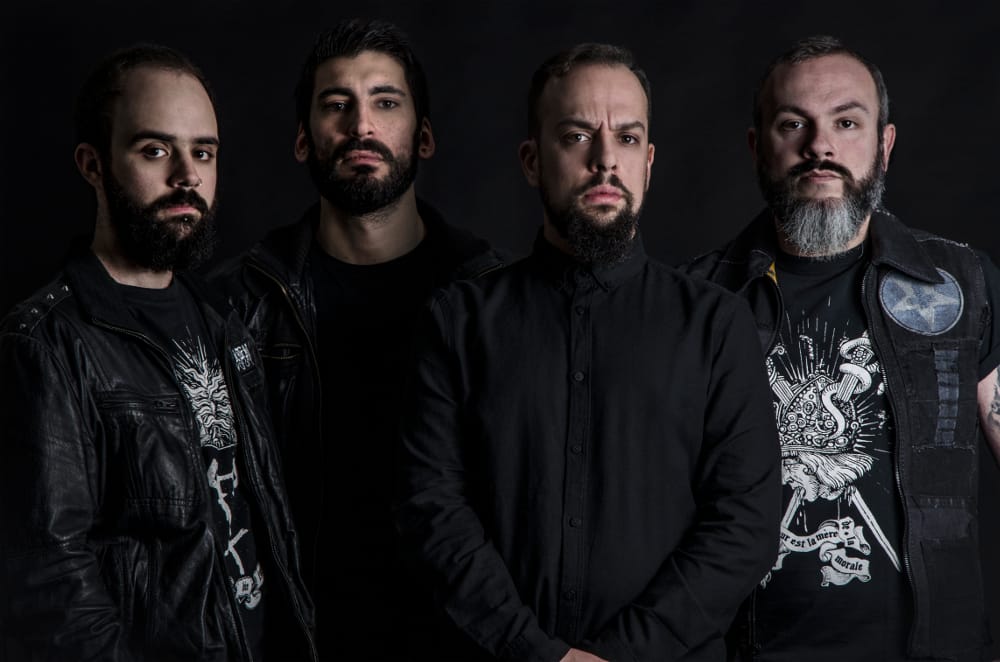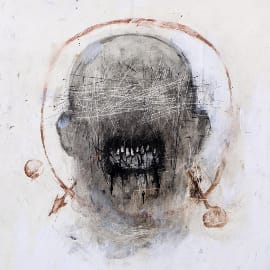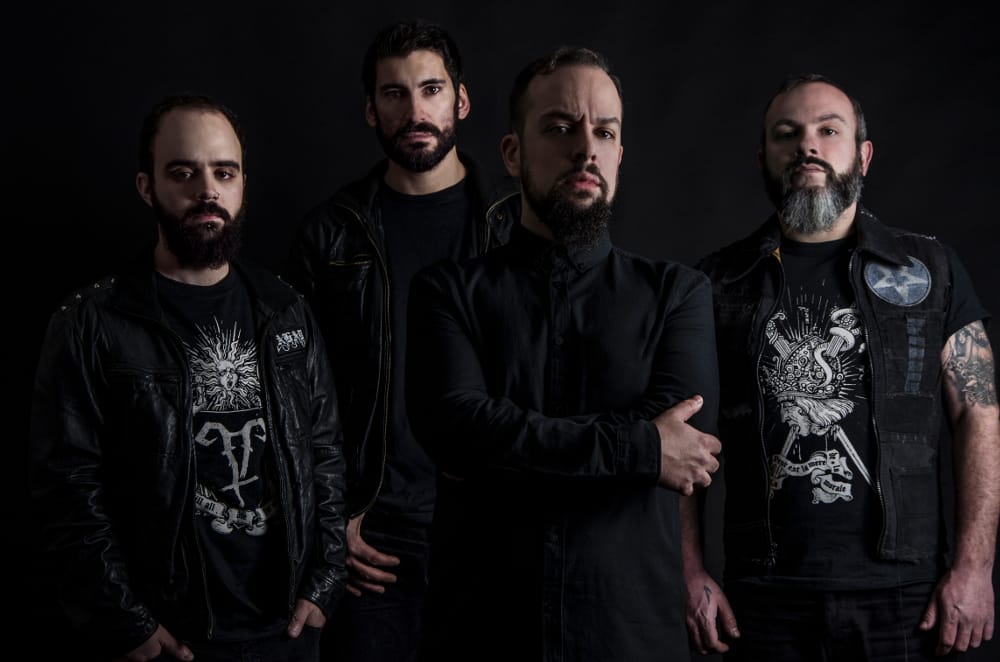With their latest record „The Second Fall“, the Greek band MAHAKALA has released an album that presents the listeners with an electrifying mixture of Heavy and Doom Metal which can already be counted among the highlights of this year. We interviewed the head of the band, bass player and singer Jim Kotsis and spoke with him of the new record, his sources of inspiration, literature, and mythology.

Hello to Greece and thanks for taking some time for this interview – I hope you guys are doing fine. Would you please be so kind and introduce the band to those of our readers who might not yet have heard of you.
Hello there and thanks for the opportunity. We are MAHAKALA, a 4-piece doom heavy metal band from Athens, Greece and we’re more than happy to have just released our sophomore full length album (fourth release in total). We like heavy guitars, groovy drums, distorted bass, 70’s vocals, intriguing song structures, catchy refrains, religion and its mythology and that’s exactly what we’ve been trying to put in our music lately.
You´ve just released your second album „The Second Fall“. Does the album sound the way you intended it to sound? Are you happy with the result?
As time passes, one gets more and more dissatisfied with his previous works. You’ll always listen to some musician saying „If I had the knowledge I now have, I would do this and that in a different way.“ That’s so fucking unfair though. Recording a full length album or even just a song is like capturing a moment, like taking a photograph of your inner self. Who you are, what you do, what you believe in… everything is captured in your songs, and creates what I call „the soul of music“. At least that’s what happens when we make music. In this aspect, I’m more than satisfied with the result of „The Second Fall“. It is very representative of who we were in the specific moments of its creation. Even brings back memories, if you know what I mean.
What exactly does the name „Mahakala“ mean?
It’s Sanskrit and means „The Great Black“.
Your first record „Devil´s Music“ received positive and sometimes even outstanding criticism. Did this circumstance put you under greater pressure in regard of the recording of „The Second Fall“?
Well, maybe a little. We’ve never been a band with an enormous fan base, but we really didn’t want to let anyone down. On the other hand there were so many issues we had to face, that left us no time to worry about anyone else but ourselves.
If you were to name the main differences between your debut and „The Second Fall“, what would you say?
It’s heavier, tighter, more metal, more mature, more European-sounding and most important, it’s performed by an entirely different line-up. Everyone in the band is new, apart from me. I’m very happy with my new band mates. It seems like they brought the band to its best shape so far.

Your new album is based on several texts by Dante, Milton, and Neil Gaiman. How did you come to choose these three authors?
I just love them. „Divine Comedy“, „Paradise Lost“, and „Sandman“ are some of the books that I read several times as a teenager and I always wanted to make something out of the experiences I got from this procedure. Religion and its mythology have always been very exciting topics for me and I strongly believe that the future lyrical concepts of MAHAKALA will be inspired from the same subjects. Not the same authors of course. Well… Maybe a little!
Which stories do your songs tell? Do they give some sort of an account of what Dante and the other writers wrote or are they actually telling your own original stories?
„The Second Fall“ is an original concept, written by me and only inspired by the above mentioned writers. It is the epic tale of Lucifer’s dethronement and severe revenge. It really is a long story that unfolds song-by-song and also has a lot of meanings lying underneath.
Mythological stories do not only articulate insights into the conditio humana, but often also contain tremendously political subtexts. Can your songs also be understood politically – or do you wanna keep your music free of politics?
Treason, revenge, dethronement, war, arrogance, vanity … There are a lot of elements in the concept of „The Second Fall“ that can certainly be applied to politics. As a band we don’t have unified political beliefs but we definitely believe in the power of one. Change yourself and see the world changing.
Would you describe „The Second Fall“ as a concept album? And are there concept albums that have had greater influence on your own work?
It certainly is a concept album. As far as I am the lyricist, you won’t see anything else than a concept album coming out of MAHAKALA. I love concept albums. I’m a huge admirer of King Diamond (who releases exclusively concept albums) and I of course love The Who’s „Quadrophenia“ and „Tommy“, W.A.S.P.’s „Crimson Idol“, Queensryche’s „Operation: Mindcrime“, Dream Theater’s „Scenes from a Memory“, even Iced Earth’s „Dark Saga“. I’m a sucker for a good concept that is being told with a good songwriting.
 Songs like „Army Of The Flies“ or „Wrath Of Lucifer (Infidels)“ seem to have strong religious connotations. What is your own perspective on religious thinking?
Songs like „Army Of The Flies“ or „Wrath Of Lucifer (Infidels)“ seem to have strong religious connotations. What is your own perspective on religious thinking?
I would say that we are what sociologists call „apatheists“. We have no religious motivation at all. Personally I like religious mythology because it’s always so good and inspiring that creates a huge contrast with all the bad influence that religion itself has on people’s lives.
Sakis Tolis, singer and guitar player of Rotting Christ (with which you once toured) appears as a guest musician on the song „Wrath Of Lucifer (Infidels)“ – how did you meet each other and why did you decide to do some recordings together?
That’s a nice story actually. I was a fan of Rotting Christ’s early discography, but I abandoned them as a listener in the 00’s. Our producer Stelios was supposed to tour with them as a sound engineer, so he invited me to their show in Patras, Greece (200km from our hometown, Athens, or something). Getting there, I met Sakis in person (never had the chance before) and watched the band live, playing for the first time with the current line-up. „Kata to Demona Eaftou“ album has been released on the same day, if I remember well. Amazing album by the way. When we met, Sakis told me that he was familiar with our music and that it would be nice for the two bands to tour together, and so it happened. The rest is history. We don’t hang out much but there is a mutual respect between us and I strongly believe that in the future we’ll share the stage again. Now, about the recording, I was looking for someone to play the part of Lucifer in the specific song, and who is better for this part than Lucifer himself? (laughs)
Do you have any tour plans for the rest of this year? And is there any chance to see you in Germany?
We’re currently working on a bunch of European dates for Fall of 2017. You’ll probably see us in Berlin at least, if everything works out well in the end!

Greece is still facing severe economical decline that has lead to social problems and frustration among the people of Greece. Has this recent development affected your own life as musicians?
You gotta be kidding me, right? Of course it has affected our lives! We’re the poorest we’ve been ever! (laughs) Well, everyone knows that music is an expensive activity (everything from gear and studio time to trying to live up to industry standards by distributing and advertising your work) and less money can really be a pain in the ass. The good thing is that by making music we’re being less frustrated but there are times when the whole economic crisis situation is so overwhelming that keeps us from doing anything we love whatsoever.
I would like to play the notorious metal1 brainstorming game with you. Just let me know whatever comes into your mind when you first read the following words:
Greek Mythology: Hesiod’s „Theogony“.
Ouzo: I hate aniseed.
Rotting Christ: Greek metal overlords.
Capitalism: Has enslaved the western civilization.
MAHAKALA in ten years: Probably different songs but with the same psychological problems! (laughs)
Thank you very much for this interview. The last words to our readers belong to you.
„Find what you love and let it kill you. Let it drain you of your all. Let it cling onto your back and weigh you down into eventual nothingness. Let it kill you and let it devour your remains. For all things will kill you, both slowly and fastly, but it’s much better to be killed by a lover.“ Charles Bukowski